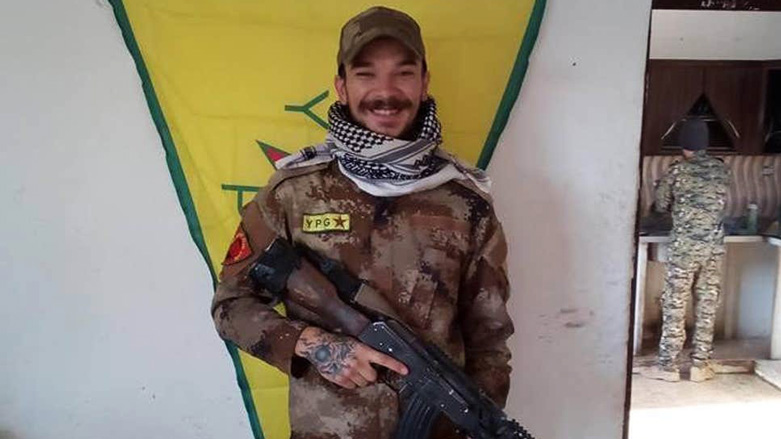British court rules that UK citizen fighting with YPG against ISIS ‘not terrorism at all’

ERBIL (Kurdistan 24) – A 28-year-old British citizen named Aiden James was sentenced on Thursday to a year in prison for attending a training camp in Iraq in 2017 run by the Kurdistan Workers Party (PKK), a group that the UK, EU, and US consider a “terrorist organization.”
The court, however, established that fighting against the Islamic State in Syria as a volunteer for the Kurdish People’s Protection Units (YPG), which Turkey sees as an offshoot of the PKK, is not a terrorism offense. As a result, James’ charges for fighting for six weeks with YPG forces were dropped.
“You were acquitted of that count because the jury was not satisfied that this training was for a terrorist purpose. That was because in those days and at that place, the YPG was training people to fight against ISIS,” the Hon. Mr. Justice Edis said in his written ruling, released on the same day.
“The YPG, which became part of the SDF [Syrian Democratic Forces], was the only defence available to the Kurdish population at that time. It is not irrelevant to the proper classification of that YPG activity that it was supporting the policy of the United Kingdom and other allies by fighting ISIS.”
The judge also stated that the YPG in some of their activities were supported by the British Royal Air Force (RAF) and the United States Air Force.
“The jury was not satisfied that the YPG had any political or religious cause beyond fighting against ISIS for which this training camp was delivering weapons training,” he said, adding, “This activity was not, on the jury’s verdict ‘noble cause terrorism’: at least for present purposes, it was not terrorism at all.”
Judge Edis characterized the YPG as a “defensive force against a lethal and genocidal threat from ISIS,” but reiterated that the training camp, located in the city of Makhmour in the Kurdistan Region of Iraq, was run by the PKK. This guerrilla group has been engaged in a decades-long insurgency against Ankara over Kurdish rights and self-rule in a conflict that has resulted in the death of over 40,000 people on both sides.
The SDF, which the YPG provides the military leadership for, reclaimed the last bit of Syrian territory from the Islamic State in March. About seven months later, the US would announce the withdrawal of all its troops from these areas following a phone call between President Donald Trump and his Turkish counterpart, Recep Tayyip Erdogan. This effectively greenlit Ankara’s offensive against the YPG in northern Syria, which began three days later.
In the end, Edis decided to ignore the sentencing guidelines of a range of 3.5 to 7 years in prison for attending a training camp run by a terrorist organization and instead handed James only 12 months for the offense. He was also sentenced to an additional three years for an unrelated offense of cocaine possession with intent to supply and a lesser sentence of just one day for possession of cannabis.
Having already served nearly half of his total four-year sentence awaiting trial, for which he will receive credit, and given available early release programs, he is expected to be released sometime in the near future.
Several British volunteers that joined the YPG have been arrested and questioned by the British police in the past. In some cases, their passports and phones were confiscated. None of them to date have been convicted for volunteering with the group.
Michael Stephens, the Research Fellow for Middle East Studies and Head of RUSI Qatar, said that in this ruling, the court had made a significant decision, that fighting for the YPG is not illegal.
“There are still a number or cases pending investigation and the police and Crown Prosecution Service will have to weigh up the impact of this ruling and the potential for successful prosecution after the James case,” he told Kurdistan 24. “I think each case will be dealt with individually, even after this case.”
Macer Gifford, a former British volunteer with the YPG told Kurdistan 24 that the trial of Aiden James has been a disaster.
“Just 1 in 10 jihadists that have returned to the UK from Syria have been prosecuted,” he said. “People up and down the UK will be confused as to why so much effort was put into prosecuting a man that went to fight in support of the UK and against ISIS.”
“Aiden James has already spent nearly 2 years in jail awaiting his sentence. Now his trial has concluded and after he has served the remainder of his time in prison, he will have spent more time in a cell than most ISIS supporters.”
He underlined that Aiden James went to join the YPG and his goal was to immediately go to Syria, but instead had to remain in Iraq for several months. “He was convicted on a technicality which is no justice at all.”
The one positive thing that can come from this case, he said, is the “recognition in a UK court that YPG and SDF volunteers that went to fight ISIS did not break the law.”
Editing by John J. Catherine
